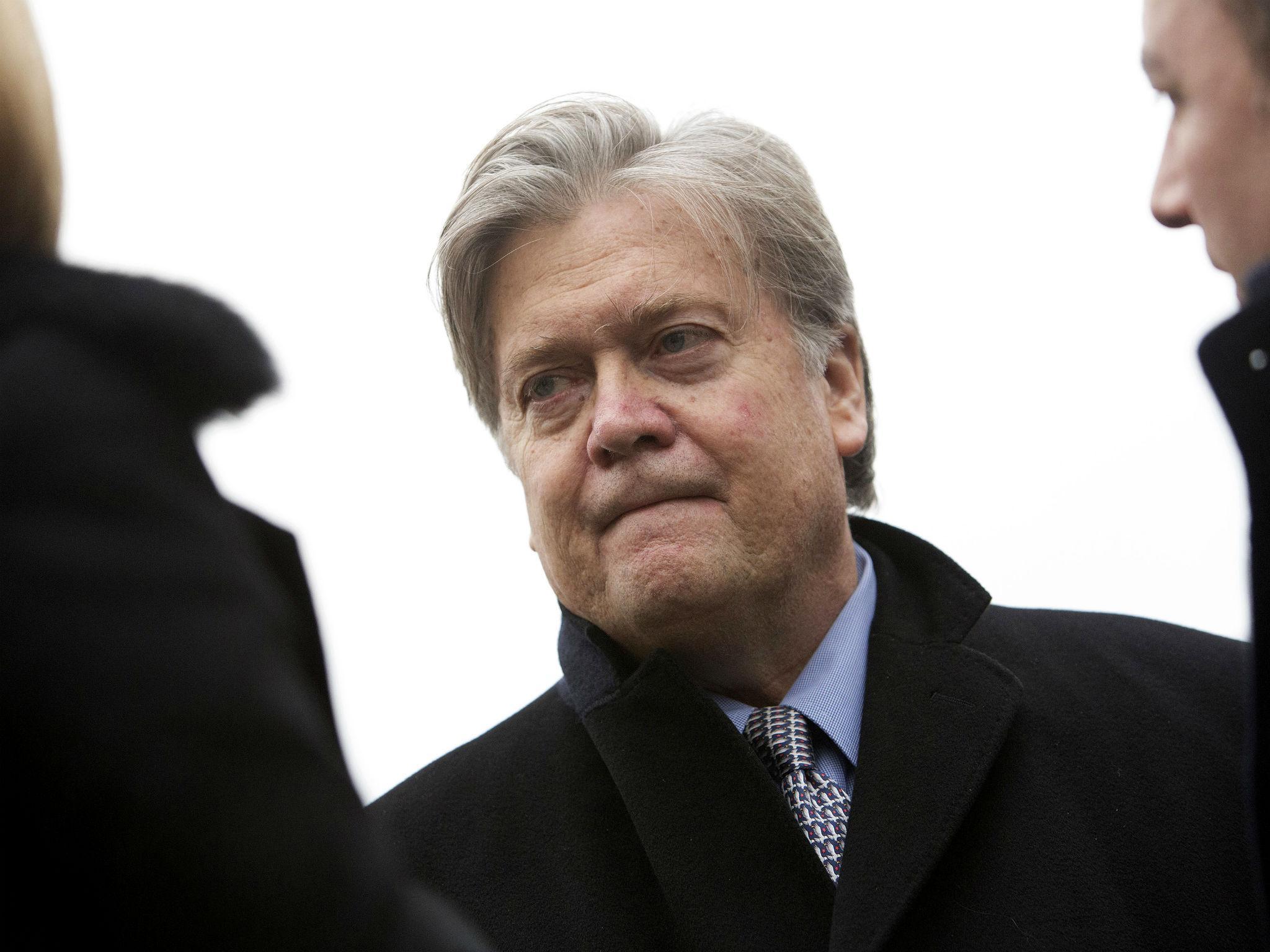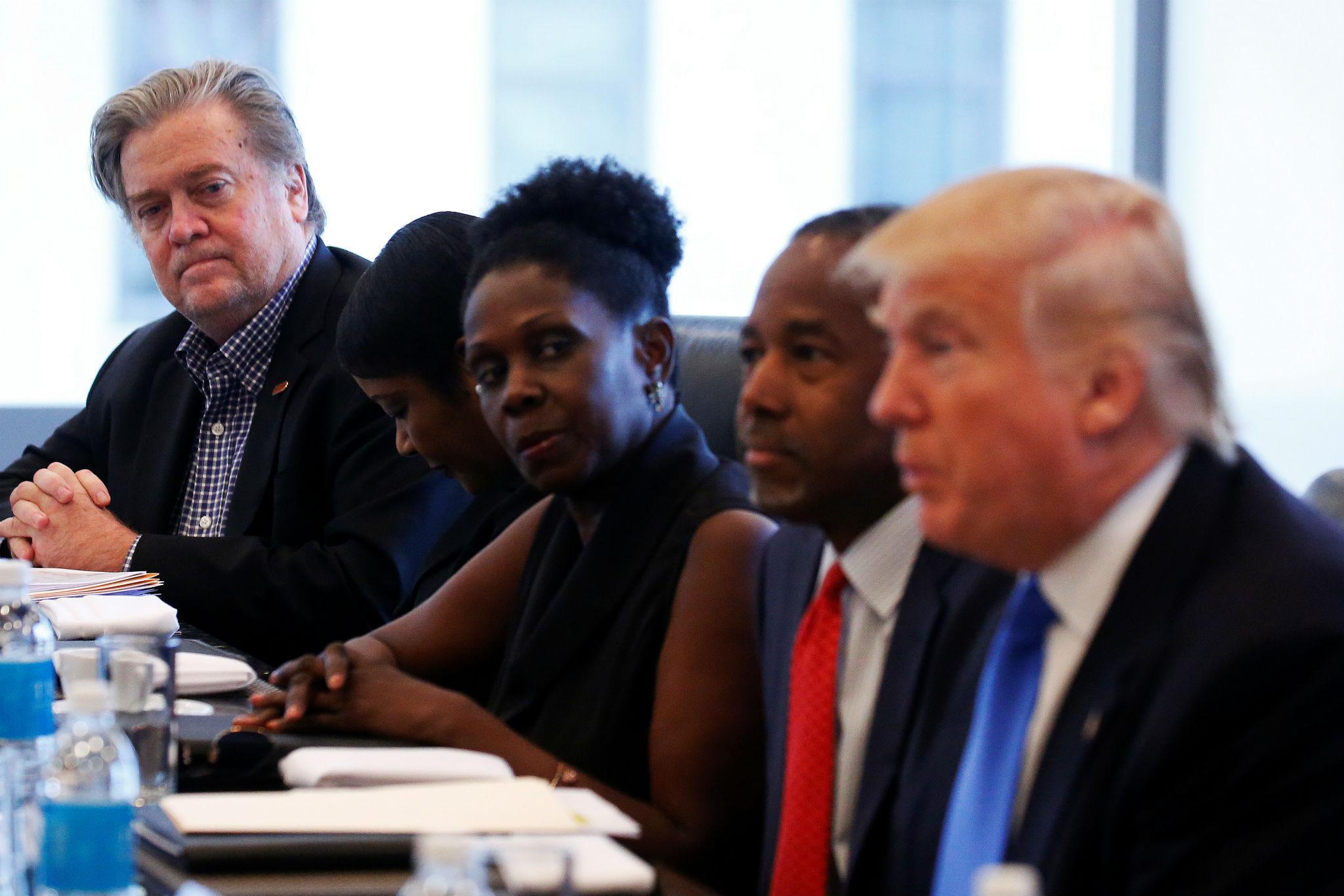We can learn a lot about Steve Bannon by watching the films he made
Before becoming President Trump’s chief strategist, Steve Bannon was a filmmaker – and his movies tell an interesting story about their maker

The first and last time I ever saw Stephen Bannon was last May at the Cannes Film Festival, where his film Clinton Cash was screening for overseas buyers. The documentary, a strategically timed takedown of Hillary Clinton centring on her alleged ethical lapses and dubious financial dealings, was based on Peter Schweizer’s 2015 book of the same name. While I interviewed Schweizer in an empty ballroom of a Croisette hotel, Bannon – who wrote and produced Clinton Cash – paced outside, occasionally stealing a furtive glance our way through an open door.
I was familiar with Bannon’s work as a filmmaker, having reviewed his 2011 documentary, The Undefeated, about Sarah Palin. So when he joined Donald Trump’s campaign last year, and later assumed duties as the president's chief strategist, his worldview wasn’t completely unknown to me.
The former Navy officer and Goldman Sachs banker entered the movie business on the money side, executive producing such highly regarded feature films as The Indian Runner and Titus. In 2004, he began producing, writing and sometimes directing his own movies, starting with In the Face of Evil: Reagan's War in Word and Deed, an admiring portrait of Ronald Reagan; since then, he’s produced films about illegal immigration (Cochise County USA: Cries from the Border, Border War: The Battle Over Illegal Immigration), the roots of the global economic crisis (Generation Zero), a nefariously overreaching federal government (Battle for America) and conservative women (Fire From the Heartland), among others.
Although Bannon has produced the occasional fiction feature, most of his creative energy has gone into making nonfiction agit-prop designed to whip viewers into a froth of either adulation or rage, but always into passionate political action. Unlike his most readily comparable counterpart, Michael Moore, who can be relied upon to serve up similarly sanguinary red meat to his base, Bannon prefers to stay in the background, wielding his auteurist power with an invisible hand.

His most recent film, Torchbearer, features Duck Dynasty patriarch Phil Robertson delivering an hour-long sermon about the existential necessity of a Judeo-Christian republic, his long grey beard and booming voice lending Old Testament gravitas to the oratory. In the 2012 film Occupy Unmasked, the late Andrew Breitbart – whose website, Breitbart News, Bannon took over that year – debunks the Occupy Wall Street movement as the cynical product of an organised Left “hellbent on the nihilistic destruction of everything the American people care for.”
Distinct Manichaean themes emerge within Bannon’s collected works, echoing the same urgent, apocalyptic anti-globalism he's espoused in speeches and on Breitbart News. Contemptuous of the “permanent political class,” crony capitalism, hippies and community organisers (who “hate this country ... hate the Constitution [and] hate freedom”), Bannon doesn't see the world in terms of partisan politics as much as a cage-match clash of civilizations: In the 2012 documentary District of Corruption, about the conservative watchdog group and longtime Clinton antagonists Judicial Watch, the filmmaker doesn't exempt George W. Bush from scrutiny, recounting such controversies as the Jack Abramoff scandal, Dick Cheney’s closed-door energy task force and the special treatment of bin Laden and Saudi royal family members immediately after September 11 2001. Still, most of District of Corruption is spent attacking Barack Obama for voting irregularities, lack of transparency, executive overreach and filling high-ranking positions with big-money donors.
Interestingly, Trump himself now stands accused of those very same transgressions, as well as foreign and financial entanglements that have already prompted a clutch of lawsuits. At Cannes last May, when Schweizer insisted that his real target wasn't the Clintons but the “apparatus which allows foreign money to influence American political figures,” he vowed that if Trump won the election, he would investigate him just as energetically. When I recently inquired how that project was going via Twitter, Schweizer responded, “I had four years of material for the #ClintonCash movie. Give it time ...”
If Schweizer makes good on his promise, odds are good that the film he makes won't be a Stephen Bannon production. In the meantime, it seems that Trump is clearly a fan of the Bannon canon: His recent policy actions, particularly the travel ban on refugees from seven majority-Muslim countries, can be traced, directly or at least philosophically, to the views espoused in Bannon's films.
But far more than content, it’s Bannon’s formal strategy that has clearly informed the early days of the Trump administration, during which headlong gestures and heated dialogue have outpaced the niceties of protocol and collegial politesse. As a filmmaker, Bannon has refined a distinctive rhetoric, usually composed of a verbal argument illustrated by febrile images, lurid graphics and visual effects that run the gamut from slick to schlocky, all set to vaguely alarmist music that grows more threatening as the film reaches its doomsday climax.

Watch Apple TV+ free for 7 day
New subscribers only. £9.99/mo. after free trial. Plan auto-renews until cancelled.
ADVERTISEMENT. If you sign up to this service we will earn commission. This revenue helps to fund journalism across The Independent.

Watch Apple TV+ free for 7 day
New subscribers only. £9.99/mo. after free trial. Plan auto-renews until cancelled.
ADVERTISEMENT. If you sign up to this service we will earn commission. This revenue helps to fund journalism across The Independent.
The result is something akin to a Fox News version of Leni Riefenstahl, with all of her propagandistic fervour and none of her compositional elegance. As a visual stylist, Bannon favours standard direct-to-video flourishes: stock footage of money being printed and writhing, unkempt flower children, frenetic editing, and, at least in Torchbearer, bloody re-enactments of Christian persecution.
Even his public statements are grounded in shock-and-awe entertainment values. “Dick Cheney. Darth Vader. Satan. That's power,” he told the Hollywood Reporter last year. Two years earlier, during a conference at the Vatican, he could have been delivering an elevator pitch for one of his coming attractions when he described the crisis of what he called “jihadist Islamic fascism”: There's “a major war brewing, a war that's already global,” he said during a Skype call from his Los Angeles office. “Every day that we refuse to look at this as what it is – and the scale of it, and really the viciousness of it – will be a day where you will rue that we didn't act.”
As a seasoned pro with a knack for narrative and heightened emotional stakes, Bannon knows how to work a crowd. And he knows the value of a compulsively watchable protagonist, whether it's a charismatic figure such as Palin or Robertson, an anti-hero on a par with Hillary Clinton or a “blunt instrument” like Trump, with whom he shares an instinct for camera-ready stagecraft.
Even Trump's rollout of the new immigration plan – announced unvetted, and before the people in charge of implementing and enforcing it had been properly read in – felt more like the adrenaline-fuelled jolt of superhero catharsis than carefully considered policy. (Legislative process, apparently, is strictly for art-house nerds.)
In other words, Bannon is as reflexively attuned to the spectacle as the substance of the “major war” that he and his boss are girding themselves to wage. The paradigm shift he craves is less about constitutional norms and democratic institutions - which have a tendency to bog down the second act - than the kind of propulsive provocations he has specialised in as a consummate showman.
As far as political reality goes, it’s Bannon’s movie, we're now in it, and the opening credits have just started to roll.
The Washington Post
Join our commenting forum
Join thought-provoking conversations, follow other Independent readers and see their replies
Comments
Bookmark popover
Removed from bookmarks